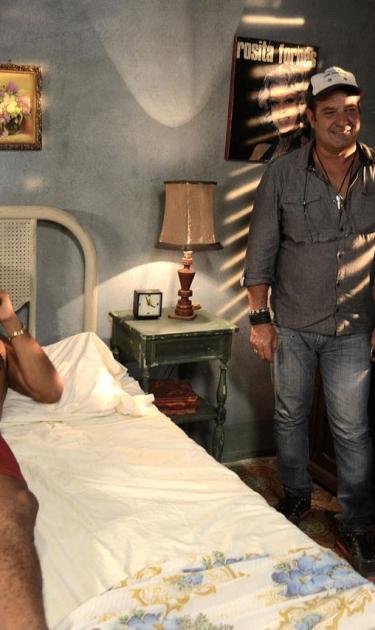“When I was seven years old, the Virgin of Fátima appeared to me in the kitchen of my house in Madruga. That’s why people sometimes see a pink halo around my head.” That’s how Manolito, the protagonist of Jorge Perugorría‘s film Fátima o el parque de la fraternidad introduces himself to us. The voiceover is lifted almost verbatim from Miguel Barnet’s short story by the same name. In that stream-of-consciousness narrative we get to learn how the once effeminate young boy from the country—who once easily bedded many of those macho-looking guys in his hometown out in the fields—has become Fátima, the Queen of the Night, a stunning and cunning drag queen who picks up tricks in the streets of Havana. The equally lurid and fabulous world Barnet conjures in his prose remains intact in Perrugoría’s adaptation, even as it ends up relying a bit too heavily on the Cuban writer’s words to move its tricky storyline along.
Set on Valentine’s Day in the present, a call forces Fátima, who now rarely wears men’s clothes and lives as a woman 24/7, to take stock of how she ended up where she is. And so we get flashbacks to her teenage confrontations with her homophobic father and supportive mother, to his eventual arrival in Havana where he’s immediately attacked by a homophobic mugger, and to the ill-fated love story that occupies her days still. Seeing actor Carlos Enrique Almirante go from tender and trusting Manolito to hopeful if scorned Fátima is one of the film’s many triumphs, which tries to echo Barnet’s winding prose with quick-cutting edits and dreamy montages throughout.
Comparisons to similarly-themed Viva and even El rey de la Havana—both of which saw Cuban actor Hector Medina play queer figures who sold his body in the streets and found strength in women’s garbs—are undeniable. But Fátima o el parque de la fraternidad exists more as a portrait of a character whose newfound persona (based, of course, on that childhood apparition) gives them the strength to carry on. Whether lip syncing at cabarets and fulfilling his lifelong dream of performing, slowly coming to question his own gender identity in front of the mirror as he tucks and dons make-up, or confronting the danger of being a sex worker in Havana (one whose boyfriend slash pimp is obviously exploiting), Fátima remains steadfast in her hopefulness.
The drama played this year at the Havana Film Festival New York where both screenings were followed by Q&As with lead actor Carlos Enrique Almirante who talked about playing this most challenging of characters and why he was drawn to the project in the first place. Check out highlights from one the Q&A below.

On Preparing to Play Manolito/Fátima
Well, it was very difficult prepping for this character. I only had one month before we started shooting. In that month I actually worked at a cabaret that features these type of shows. And you know, in the middle of the lineup of performers, I’d come out and do the song that my character lip syncs to in the film. I even got a handful of tips—on my chest, even! It was a great experience. Also, walking in heels… I’ll say this: I am now in awe of women who do it daily. I have a newfound respect for that. I don’t know how they do it.
In that month when I prepped for Fátima, I kept a pair of heels next to my bed. When I got up, rather than put on slippers, I’d wear my heels around the house. I also interviewed several people to hear their stories. That was a really beautiful part of my research for this character. And Jorge Perugorría helped me out a lot in that sense.
On the Hopeful Tone of the Film
I think as I said before we screened the film, this is a story about life. It’s a story about what our character goes through as they hope to achieve their dream, as they try and find happiness. That’s irrespective of his sexuality, really. That’s what drew me to this character and what caught the eye of Perugorría, why he wanted to direct it. It’s a very uplifting and optimistic story about someone who’s very frustrated about the society he lives in, and the rejection he has to deal with. But it’s about finding satisfaction within himself, to find happiness in feeling like and being a woman.
On Creating a Character Anyone Can Relate to
Well, I did mention ahead of the screening that this was a film about a queer character in order to prepare you for what you were about to see. You know, so that you’d know a bit about its director and that it was based on this Miguel Barnet short story. It wasn’t to be defensive or anything. I just think he’s a character anyone can relate to and identify with. Because of his thirst for life and his need to reach for his dreams. That has little to do with his sexual orientation. I just think he speaks to all of us.
Fátima o el parque de la fraternidad screened at the Havana Film Festival New York. The Q&A was conducted in Spanish and has been translated by the author for Remezcla.




